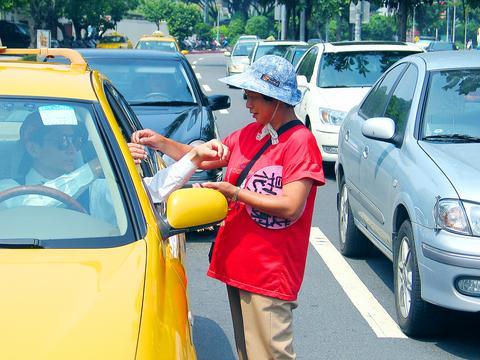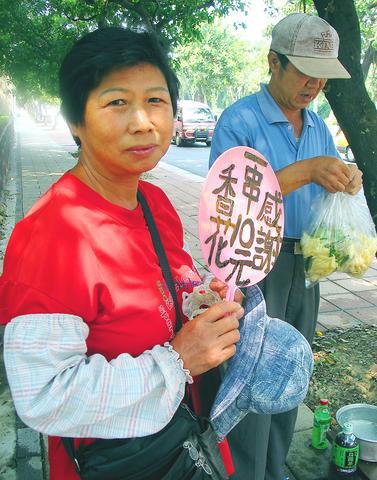As the traffic light turns red and the sea of vehicles slows to a complete stop, Mrs. Lee steps out onto the freeway armed with determination and a basket of flowers she hopes to sell before the light changes color.
Her livelihood, like other elderly in Taipei, rests on a wire string of yulan flowers (玉蘭花) sold for NT$10 in some of the city's busiest intersections. Traffic pollution, careless drivers and relentless weather are a lot to combat for a job that isn't even legal in Taiwan. But as Lee, who preferred to only give her surname, pointed out that it's difficult for old people to find work and selling yulan flowers is one job that doesn't discriminate against age.

PHOTOS: DIANA FREUNDL, TAIPEI TIMES
The yulan belongs to the magnolia family and in addition to being a popular subject of Chinese watercolor paintings, the fragrant flower is often used as an air-freshener and for offerings to deities in temples. Yulan trees are visible around the island, but thrive in the south where the blossoms are picked and delivered daily to flower markets in Taipei.

As the sun beat down on a cloudless Saturday afternoon, Lee trotted up and down the freeway with a sign in one hand and flowers in the other stopping at the windows of air-conditioned cars to exchange hours of labor for a few dollars.
She and her husband, Mr. Wang, began selling yulan flowers after a metal factory they worked at relocated to China. After she lost her job, Lee learned how to string yulan flowers while helping her neighbor. The man, in his late seventies, fell ill and suggested Lee and her husband take over his location near the Grand Hotel in Taipei. Now, nearly four years later, the two make an early morning trek from their home in Sanchung to Yuanshan every day.
They arrive at the flower market in Neihu at 6am to buy NT$900 worth of the small white blossoms. From there they take the materials to a nearby park and spend three hours threading the petals onto wire strings. Anytime after 9am, Lee heads into the traffic while Wang mans the roadside stall submerging the flowers in containers of water to keep them from drying out in the heat. It takes the pair five to seven hours to sell some 200 bunches earning a shared profit of NT$1,000, approximately half of what they earned at their previous job, Lee said.
To make up for the loss in wages, the couple works everyday regardless of how hot or cold the temperature. "No day off, no rest except when the rain is very heavy, then we will stay home. But if we miss a day, then we must sell more the next day," she said walking towards her husband after the light turned green and the cars began to move.
Given the volume and speed of the traffic, one would expect to see Lee dodging cars and trucks as they accelerate to make the light. She claimed, however to have sustained no injuries marching up and down the busy intersection. Following her with a camera and some serious reservations was far less hazardous than it looked from the side of the road.
"I've never had a problem. They [the drivers] are good, they slow down when they see me. I'm not afraid of being hit. I am more afraid of the sun when it's too hot," she said putting on her hat and pulling up her arm covers before stepping out onto the street.
Selling yulan flowers in the street was banned throughout Taiwan in 1968. According to the Taipei City Government's transportation bureau, the law was introduced to prevent the obstruction of traffic, avoid accidents and protect the lives of the merchants as the number of vehicles increased in city centers. Although it has been revised several times, the current regulation states that a pedestrian caught selling yulan flowers could be fined up to NT$760.
There is a special permit for the vending of goods available to persons with a disability, but even then the vendor is limited to particular areas of the city. Both Lee and Wang are ineligible for such permits and have paid their share of fines over the past few years. Most police officers, however, recognize this as the couple's livelihood and let them off with a warning, Lee said.
Despite employment problems faced by elderly people in Taiwan, such as the growing number of factories relocating to China, Wang's impression is that the number of yulan sellers is decreasing. One reason, he believes, might be emerging casual cleaning jobs in the city's mounting office buildings. In the future yulan sellers may all but disappear from the streets of Taipei, but it won't necessarily mean the underlying social problems have been resolved.
How long does the pair plan to make a living on the compassion of commuters and pedestrians willing to part with a few dollars?
"We will keep doing it forever, until we are too old and can't do it anymore," Wang said.

In the next few months tough decisions will need to be made by the Taiwan People’s Party (TPP) and their pan-blue allies in the Chinese Nationalist Party (KMT). It will reveal just how real their alliance is with actual power at stake. Party founder Ko Wen-je (柯文哲) faced these tough questions, which we explored in part one of this series, “Ko Wen-je, the KMT’s prickly ally,” (Aug. 16, page 12). Ko was open to cooperation, but on his terms. He openly fretted about being “swallowed up” by the KMT, and was keenly aware of the experience of the People’s First Party

Aug. 25 to Aug. 31 Although Mr. Lin (林) had been married to his Japanese wife for a decade, their union was never legally recognized — and even their daughter was officially deemed illegitimate. During the first half of Japanese rule in Taiwan, only marriages between Japanese men and Taiwanese women were valid, unless the Taiwanese husband formally joined a Japanese household. In 1920, Lin took his frustrations directly to the Ministry of Home Affairs: “Since Japan took possession of Taiwan, we have obeyed the government’s directives and committed ourselves to breaking old Qing-era customs. Yet ... our marriages remain unrecognized,

Not long into Mistress Dispeller, a quietly jaw-dropping new documentary from director Elizabeth Lo, the film’s eponymous character lays out her thesis for ridding marriages of troublesome extra lovers. “When someone becomes a mistress,” she says, “it’s because they feel they don’t deserve complete love. She’s the one who needs our help the most.” Wang Zhenxi, a mistress dispeller based in north-central China’s Henan province, is one of a growing number of self-styled professionals who earn a living by intervening in people’s marriages — to “dispel” them of intruders. “I was looking for a love story set in China,” says Lo,

During the Metal Ages, prior to the arrival of the Dutch and Chinese, a great shift took place in indigenous material culture. Glass and agate beads, introduced after 400BC, completely replaced Taiwanese nephrite (jade) as the ornamental materials of choice, anthropologist Liu Jiun-Yu (劉俊昱) of the University of Washington wrote in a 2023 article. He added of the island’s modern indigenous peoples: “They are the descendants of prehistoric Formosans but have no nephrite-using cultures.” Moderns squint at that dynamic era of trade and cultural change through the mutually supporting lenses of later settler-colonialism and imperial power, which treated the indigenous as